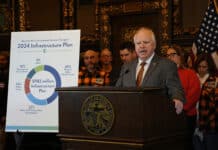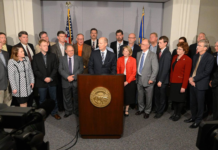ST.PAUL- On Wednesday, the Capital Investment committee in the Minnesota State House approved a $600 million dollar bonding bill (H.F. 892).
The breakdown of the proposal shows that most of the money is for infrastructure, approximately 81 percent. Around $240.2 million is being allocated for transportation, $139.8 million for water related projects, and $106 million for facilities preservation. Myron Frans, commissioner of Minnesota Management and Budget (MBB), indicated that more than $3.7 billion in requests were submitted. Indeed, much of the problem arises from the fact that in 2016 no capital investment bill was passed. Many noted that this failure resulted in a lost construction season and potential higher construction costs for this year.
This is a wide discrepancy from the Minnesota Senate’s bonding bill (S.F. 210), $1.65 billion worth in bonding funds. It also does not line up with Gov. Mark Dayton’s proposed funding bill which is $1.5 billion.
The wide discrepancy between the House, Senate, and Governor’s budget have all played an important role in the conflict between House Speaker Daudt (R-Crown), Senate Majority Leader Gazelka (R-Nisswa), and Dayton.
During the Capital Investment committee that approved the bonding bill, many spoke out in opposition to what was not being funded. In particular, quite a bit of outrage was formed around the omission of $70.3 million in renovation and expansion funds for the Minnesota Security Hospital in St. Peter, MN. Nurses and orderlies from the hospital complained that amongst other things, poor sightlines to view patients has resulted in over 100 permanent injuries per year.
Many DFL committee members were also disappointed after all 30 of their amendments to the bill were either withdrawn or defeated. Minneapolis mayoral candidate and state representative, Raymond Dehn (DFL- Minneapolis), stated “To say many of us are disappointed in the size of this bill would be an understatement.”
For many, including Republican members on the committee, this bill is seen as a starting point. Rep. Dean Urdahl (R-Grove City) stated, “This bill will change .… I can’t say what number, but it will be bigger than today.”

















